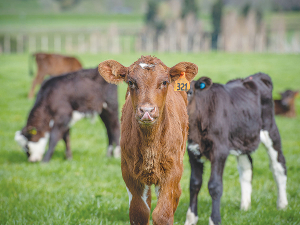TB slaughter levy for dairy jumps 75c/head
TB differential slaughter levy rates are changing with dairy animals paying $12.25/head, an increase of 75c from next month.
 Dairy farmers producing high quality calves often felt frustrated with variable and inconsistent demand from beef finishers.
Dairy farmers producing high quality calves often felt frustrated with variable and inconsistent demand from beef finishers.
Dairy farmers are being encouraged to consider using genetically superior beef bulls across their herds this spring to help create greater value along the value chain.
This is based on a recent report summarising the findings of the Beef + Lamb New Zealand Genetics’ Dairy Beef Progeny Test (DBPT).
Written by farm consultant Bob Thomson, the report summarises the findings of a whole-farm modelling process, where the progeny of the highest ranked beef bulls from the DBPT were compared with the progeny of average bulls.
These showed a 15 per cent growth advantage at 400 and 600-days compared to the average bulls. This would improve gross margin returns by between $211 and $261/ ha and improve feed conversion efficiency by 9 per cent. This in turn would reduce greenhouse gas emissions.
The modelling demonstrated that when the top 10-15 per cent of DBPT bulls for marbling (intramuscular fat) were compared with the average DBPT bulls there was a 27 per cent improvement. This correlated with an increase in the strike rate with beef quality supply programmes, although with a price premium of 30c/kg CW, this increased the gross margin by up to another $51/ha.
The modelling also compared one and two winter finishing policies and highlighted clear advantages and disadvantages to both. The ranking of DBPT bulls did not change between the two policies.
Compared to the twowinter, the one-winter system occupied one third less land area with 15 per cent more feed conversion efficiencies.
The disadvantage was in lighter carcase weights (160-220kg CW) when processed between November and February. These weights were outside targeted beef grading and associated payment schedules.
Building a connection between dairy farmer and finisher
The report noted a disconnect between dairy farmers and beef finishers and the advantages for both parties to address this.
Working with a dairy farmer who is investing in superior beef genetics gives the finisher the opportunity to benefit from significantly improved growth rates and carcase attributes.
The report states that this disconnect has come about because finishers tend to prefer to buy dairy-beef spring-born weaners in autumn rather than rear them over summer. In drought years, when this is most apparent, there is little difference in the price between autumn and spring calves.
Dairy farmers producing high quality calves often felt frustrated with variable and inconsistent demand from beef finishers irrespective of whether they are four to five-day old weaners or 100kg weaners.
“Once the calves leave the dairy farm the connection back to their genetic merit is usually lost.
Budou are being picked now in Bridge Pā, the most intense and exciting time of the year for the Greencollar team – and the harvest of the finest eating grapes is weeks earlier than expected.
The Real Estate Institute of New Zealand (REINZ) has released its latest rural property report, providing a detailed view of New Zealand’s rural real estate market for the 12 months ending December 2025.
Rural retailer Farmlands has released it's latest round of half-year results, labeling it as evidence that its five-year strategy is delivering on financial performance and better value for members.
OPINION: "We are back to where we were a year ago," according to a leading banking analyst in the UK, referring to US president Donald Trump's latest imposition of a global 10% tariff on all exports into the US.
DairyNZ says the Government’s proposed Resource Management Act reform needs further work to ensure it delivers on its intent.
Overseas Trade Minister Todd McClay says he's working constructively with the Labour Party in the hope they will endorse the free trade agreement (FTA) with India when the agreement comes before Parliament for ratification.
OPINION: Expect the Indian free trade deal to feature strongly in the election campaign.
OPINION: One of the world's largest ice cream makers, Nestlé, is going cold on the viability of making the dessert.